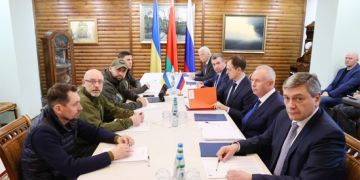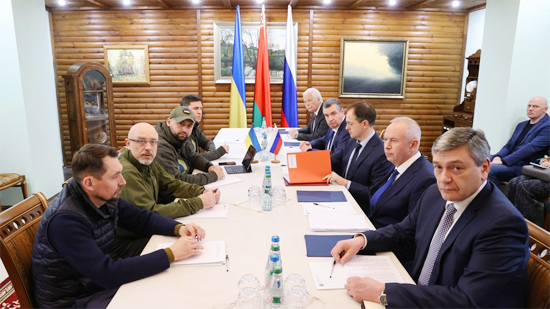CGTN
On April 4, Chinese State Councilor and Foreign Minister Wang Yi had a phone conversation with Ukrainian Foreign Minister Dmytro Kuleba, underlining the value of peace talks to achieve a ceasefire, and the need of a European security mechanism that is balanced, effective and sustainable.
Wang Yi said, on the Ukraine issue, China does not seek geopolitical self-interest, nor does China have the mentality of watching the fire from a safe distance, still less do anything that adds fuel to the fire. The only goal that China sincerely looks forward to is peace.
The high-profile exchange on April 4 is part of a larger, sustained effort on China’s part to coordinate constructive diplomacy on Ukraine with all parties. It is evidenced by Wang’s recent exchanges with foreign ministers from several nations.
In communicating expectation on an eventual end to wars, Wang is correct to draw Kuleba’s attention towards the determinants of lasting peace: a European security mechanism that is established on the back of “equal-footed dialogue,” and underpinned by the principle of indivisible security. In the current context of Ukraine-Russia tensions, equal recognition of each party’s legitimate concerns is a key to synthesizing differences, and any view of absolute security risks complicating prospects for negotiated peace.
A balanced and effective security mechanism can also enable European countries to maintain their independence in facilitating prospective ceasefire momentum. It also serves European interests because a mechanism founded on indivisible security could send a message of future assurance to Ukraine, once fighting comes to a halt in the current conflict. “China believes that the Ukrainian side has enough wisdom to independently make choices in line with the fundamental interests of its people,” said Wang.
This call to support Ukrainian trajectory on peace – free of foreign prescriptions – is equally important, because as a sovereign power, it is Ukraine that must be encouraged to exercise its autonomy and judgement when concerning its people’s interests. On what role nations should assume, Wang’s exchange with Kuleba made a suggestion clear: objectivity and impartiality must represent meaningful diplomacy, rather than geopolitical interest. A similar defense for independent judgement could also be observed in Wang’s telephonic exchange with Hungarian foreign affairs and trade minister Peter Szijjarto, where vouching for independence was key in a new period of “turbulence and transformation.”
With Israeli foreign minister Yair Lapid, Wang built on shared concerns over Ukraine, and cautioned against moves that risked prospects for a ceasefire and overall peace between both sides. For instance, on achieving the former, Wang drew on China’s principled stance that “there can be no more moves that add fuel to the flame.” China’s top diplomat has a point: part of the reason why Russia-Ukraine peace talks are yet to see rapid progression is because unilateral sanctions and pressure campaigns serve as irritants in cultivating bilateral trust.
Interestingly, history provides a valuable measure of Beijing’s demonstrated aversion to war, and its embrace of peace during conflict. Consider China’s time-tested foreign policy. It operates on the principle of noninterference, and continues to remain sensitive to pressing regional challenges and spillovers faced by nations around the world. A fitting illustration is Wang’s joint position with his Thai counterpart.
Both sides agreed on the need to curb the spread of negative spillover effects from the Ukraine situation, a necessity reinforced by price shocks that have disproportionately exacerbated challenges of economic recovery for less developed nations. That itself underlines the value of pursuing coordinated diplomacy on Ukraine, as exemplified by Beijing’s efforts, and contribute to the situation’s peaceful development. The momentum of global economic recovery partly depends on it.
A key message from Wang’s telephonic conversation with Canadian Foreign Minister Mélanie Joly on April 5 was for all parties to cultivate opportunities for peace and become receptive to the prospect of opening-up talks. After all, Wang’s acknowledgement of present challenges is not without firm basis: unsubstantiated accusations of war crimes, more potential sanctions, and a reluctance by select Western countries to see dialogue on an equal-footing, are developments ill-suited to a delicate process of negotiated peace. Thus, closing ranks behind meaningful dialogue should be the global imperative to aspire for.
Beijing continues to remind the world that productive talks and peace building are the only way out of current tensions. That understanding is chief to China’s contribution towards the peaceful development of the Ukraine situation, reinforced by Wang’s talks. Recall Wang’s elaboration of China’s multi pronged perseverance on the Ukraine issue: Two key elements were to advance peace talks in the right direction, and also uphold the legitimate rights and interests of all countries, without exception. “China will continue to work with the international community, in accordance with the wishes of the parties concerned… to play a constructive role in promoting peace talks and safeguarding peace,” said Wang on March 31.
Thus understood, furthering peaceful engagement on Ukraine, rather than pivoting towards ideology and military considerations, is what responsible diplomacy should be about.





